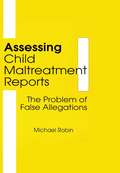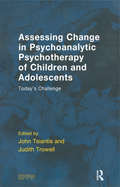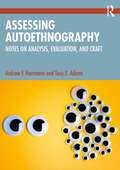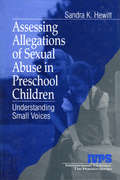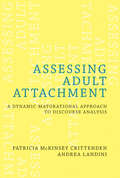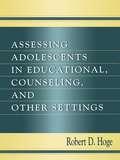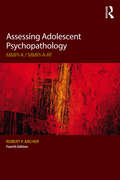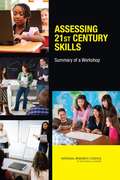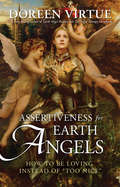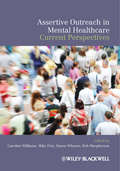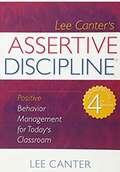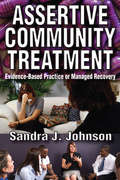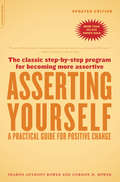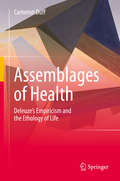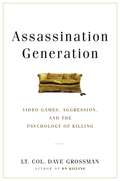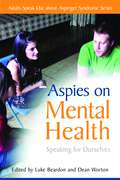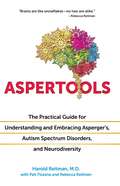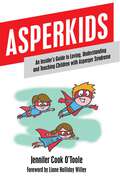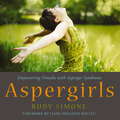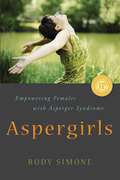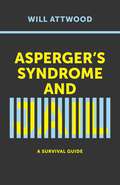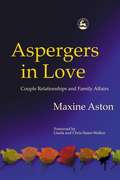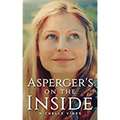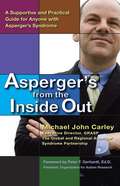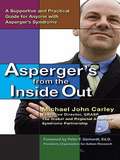- Table View
- List View
Assessing Child Maltreatment Reports: The Problem of False Allegations
by Michael Robin Jerome BekerThis seminal book in the literature of child protective services stimulates critical thinking and informed discussion for those professionals and educators concerned with the quality of children’s protective services. The first book of its kind to present scholarly reports on false allegations, Assessing Child Maltreatment Reports tackles the age-old problem of deciding which reports, verbal or written, represent truth and which represent falsehood. When one deals with accusations in the area of child maltreatment, special problems are posed. This vital resource brings home the complexity and seriousness of confronting the need to separate true reports from false reports. Given the serious consequences of reports of maltreatment, determining the accuracy or inaccuracy of such reports is of major critical importance to all concerned and the parents, children, and professionals directly involved. This book deals effectively and practically with the everyday work of assessing the validity and reliability of maltreatment reports and guides professionals through rough waters of finding truth with helpful research.This courageous book provides hope for establishing a deeper understanding of the broad system of child protection and consequently, enables professionals to better handle individual crises and cases. Containing a range of chapters--authored by leading academic researchers and practitioners in child welfare services in the United States--which examine the policy and practice issues related to false allegations of child abuse and neglect, this volume provides guideposts for further research and discussion. College and university students in child welfare and related programs, human service practitioners working in child protective and welfare services, and the larger public--both parents and professionals working with children--who have an interest in this important issue, will find Assessing Child Maltreatment Reports a compassionate approach to a sensitive issue.
Assessing Change in Psychoanalytic Psychotherapy of Children and Adolescents: Today's Challenge (The\efpp Monograph Ser.)
by Judith Trowell John TsiantisThis book draws together work from across Europe by leading clinical researchers who have been looking into the effectiveness of psychoanalytic interventions. They are mostly time limited, brief, non-intensive ways of working so are applicable in many settings and can therefore be generalised to other clinical teams. The populations worked with are diverse and often present mainstream services with refractory clinical problems, so an applied psychoanalytic approach is well worth trying, given the evidence presented in this volume. There is in addition an excellent theoretical chapter on the issues of such clinical research from Stephen Shirk which merits consideration by those wishing to evaluate their own work. This book is an important contribution to services for child and adolescent mental health. With increasing family distress and concerns about inadequate parenting, family breakdown and troublesome adolescents, it will help to ensure the full menu of interventions is retained in these times of financial restraint.
Assessing Autoethnography: Notes on Analysis, Evaluation, and Craft
by Tony E. Adams Andrew F. HerrmannAssessing Autoethnography provides readers with multiple ways to analyze autoethnographies and other forms of personal narrative writing. Given the proliferation of such forms across academic contexts, the book offers a guide of what autoethnography is, why it matters, and how to do it.Taking each of the three parts of auto-, ethno-, and -graphy in detail, Herrmann, and Adams, provide criteria and points of discussion to ensure robust assessment of an autoethnographic work as a whole. Every chapter is accompanied with exemplars and considers issues such as ethics, storytelling, and good writing. The book discerns the kinds of personal experiences that often work best for autoethnographic projects and provide ways to evaluate fieldwork, interviews, and representations.Written by two experts in the field, Assessing Autoethnography offers guidance to scholars and dissertation advisors, across diverse disciplines, in producing autoethnographic work and utilizing autoethnographic methods. The book will be of interest to researchers in the fields of Communication Studies, Education, Sociology, Women’s and Gender Studies, Critical Race Studies, Mass Communication, English, and other related disciplines.
Assessing Allegations of Sexual Abuse in Preschool Children: Understanding Small Voices
by Dr Sandra K. HewittWritten to help frontline practitioners assess and manage cases with children aged 18 months to six years who present allegations of child abuse, this book provides concrete and easily understood information about basic child development, interview procedures, and case management theory. Extensive experience is integrated with the research literature to provide: an overview of child development information as it applies to interviewing young children a protocol for assessment of preverbal children that is grounded in theory and research a format for assessment of children aged three to five a review of the strengths and weaknesses of some current interview formats a technique for structured interviewing
Assessing Adult Attachment: A Dynamic-Maturational Approach to Discourse Analysis
by Patricia Mckinsey Crittenden Andrea LandiniA method for identifying the psychological and interpersonal self-protective attachment strategies of adults. This book focuses upon new methods of analysis for adult attachment texts. The authors' introduce a highly nuanced model--the Dynamic-Maturational Model (DMM)--providing clinicians with a finely-tuned tool for helping patients examine past relationships, in addition to gauging the potential effectiveness of various treatment options. The authors offer a fascinating explanation of the neurobiological underpinnings of DMM, grounded in findings from the cognitive neurosciences about information processing. In this volume, readers have an eminently practical, theoretically-grounded work that is sure to transform many types of therapy.
Assessing Adolescents in Educational, Counseling, and Other Settings
by Robert D. HogeAdolescence is a distinct period of development that presents a number of special challenges. This fact has important implications for professionals selecting and administering assessment procedures and interpreting the data they yield, yet assessment texts have focused on adults or children and devoted minimal attention to adolescents. This book constitutes the first up-to-date and practical guide to the effective psychological assessment of adolescents. Throughout, the author's emphasis is on standardized instruments. Their use, he argues, provides more valid information about individuals, leads to better treatment or placement decisions, and contributes to the more efficient management of organizational resources than does reliance on clinical interviews and judgment alone. Assessing Adolescents in Educational, Counseling, and Other Settings will be welcomed by all those professionally involved in the assessment of adolescents--psychologists, psychiatrists, social workers, child care agency staff, and educators--as well as by those who must make decisions based on their assessments--school principals, youth court judges, and managers of residential treatment facilities among others. Developmental researchers will also find this review of available standardized tools helpful in their work.
Assessing Adolescent Psychopathology: MMPI-A / MMPI-A-RF, Fourth Edition
by Robert P. ArcherAssessing Adolescent Psychopathology: MMPI-A / MMPI-A-RF, Fourth Edition provides updated recommendations for researchers and clinicians concerning the MMPI-A, the most widely used objective personality test with adolescents, and also introduces the MMPI-A-Restructured Form (MMPI-A-RF), the newest form of the MMPI for use with adolescents. Further, this fourth edition includes comprehensive information on both MMPI forms for adolescents, including descriptions of the development, structure, and interpretive approaches to the MMPI-A and the MMPI-A-RF. This text provides extensive clinical case examples of the interpretation of both tests, including samples of computer based test package output, and identifies important areas of similarities and differences between these two important tests of adolescent psychopathology.
Assessing 21st Century Skills: Summary of a Workshop
by Judith Anderson KoenigThe routine jobs of yesterday are being replaced by technology and/or shipped off-shore. In their place, job categories that require knowledge management, abstract reasoning, and personal services seem to be growing. The modern workplace requires workers to have broad cognitive and affective skills. Often referred to as "21st century skills," these skills include being able to solve complex problems, to think critically about tasks, to effectively communicate with people from a variety of different cultures and using a variety of different techniques, to work in collaboration with others, to adapt to rapidly changing environments and conditions for performing tasks, to effectively manage one's work, and to acquire new skills and information on one's own. The National Research Council (NRC) has convened two prior workshops on the topic of 21st century skills. The first, held in 2007, was designed to examine research on the skills required for the 21st century workplace and the extent to which they are meaningfully different from earlier eras and require corresponding changes in educational experiences. The second workshop, held in 2009, was designed to explore demand for these types of skills, consider intersections between science education reform goals and 21st century skills, examine models of high-quality science instruction that may develop the skills, and consider science teacher readiness for 21st century skills. The third workshop was intended to delve more deeply into the topic of assessment. The goal for this workshop was to capitalize on the prior efforts and explore strategies for assessing the five skills identified earlier. The Committee on the Assessment of 21st Century Skills was asked to organize a workshop that reviewed the assessments and related research for each of the five skills identified at the previous workshops, with special attention to recent developments in technology-enabled assessment of critical thinking and problem-solving skills. In designing the workshop, the committee collapsed the five skills into three broad clusters as shown below: Cognitive skills: nonroutine problem solving, critical thinking, systems thinking Interpersonal skills: complex communication, social skills, team-work, cultural sensitivity, dealing with diversity Intrapersonal skills: self-management, time management, self-development, self-regulation, adaptability, executive functioning Assessing 21st Century Skills provides an integrated summary of the presentations and discussions from both parts of the third workshop.
Assertiveness for Earth Angels: How To Be Loving Instead Of Too Nice
by Doreen VirtueDo people take advantage of your niceness? In this groundbreaking book, Doreen Virtue teaches Earth Angels -extremely sweet people who care more about others' happiness than their own-how to maintain their inner peace and loving nature while at the same time holding boundaries. You'll discover how to overcome fears about saying no, and how to ask for what you want from those around you and from the universe. Assertiveness for Earth Angels is for anyone who wants to learn the art of speaking up in relationships and in their activism about issues related to the world. Whether you need more assertiveness with your family, on the job, or in your healing work, you'll appreciate Doreen's gentle-but-firm approach to negotiating your earthly needs in heavenly ways!
Assertive Outreach in Mental Healthcare: Current Perspectives
by Mike Firn Caroline Williams Rob Macpherson Simon WharneAssertive Outreach in Mental Healthcare: Current Perspectives explores experiences, successes, interventions, and service user stories as well as lessons learned from the implementation experience surrounding assertive intervention. It provides a synthesis of expert experience in the field as well as experiences of grass roots team practitioners.This book makes a valuable contribution to the field by addressing in depth a wide range of topics critical to the delivery of assertive outreach services and providing practitioners with a manual into which they can feed lessons learned from other teams for continuous service improvement. This book is an essential reference for anyone with an interest in assertive outreach and community treatment approaches in mental health. Special features: Provides a contemporary analysis of current service developments in the area Written by experts in the field Covers cross-cutting issues relevant to all areas of community mental health care Includes multiple perspectives: service user, researcher, service manager, commissioner, clinician and carer Covers both service delivery and therapeutic interventions Explores how the assertive outreach model is applied in the UK and Europe
Assertive Discipline: Positive Behavior Management for Today's Classroom
by Lee CanterThis book contains the best concepts and teacher-tested strategies by the author plus new content. A special emphasis on the needs of new and struggling teachers includes practical actions for earning student respect and teaching them behavior management skills. <[p><P>The author also introduces a real-time coaching model and explains how to establish a school wide Assertive Discipline program.
Assertive Community Treatment: Evidence-based Practice or Managed Recovery
by Sandra JohnsonThe twenty-first century has witnessed an explosion in studies on comparative health studies, but mental health remains virtually ignored. Unlike the well researched topic of health policy, there is a gap in the marketplace covering mental health policy and health care policymaking. This book fills that gap; it is a comparative analysis of the implementation of Assertive Community Treatment (ACT), an evidence-based practice employed in two states that promises to empower the well-being of individuals suffering from mental illness.Assertive Community Treatment specifically examines the tension separating the notion of client recovery and evidence-based programs. Johnson challenges the assumption that practitioners should rely on evidence-based practices to close the gap between scientific knowledge and practice. She argues that in an era of managed care, this encourages state mental health administrators to adopt policies that are overly focused on outcomes. Programs that can measure the outcomes of care provided, and evidence-based practices, have become central aspects of the quality care agenda.This study traces the role of policy entrepreneurs throughout the Assertive Community Treatment policymaking process. By differentiating mental health in general, qualitative research increases the chances of observing similarities and differences in outcomes. Johnson explains why the ACT model was adopted and implemented. She concludes that there is a clear monopoly by medical researchers and scientists within Assertive Community Treatment research, and as a result, too much emphasis is placed on the roles of policy entrepreneurs as the main innovators in the agenda and policy formulation stages. Johnson presents a strong argument for more innovation in the implementation stage.
Asserting Yourself-Updated Edition: A Practical Guide For Positive Change
by Sharon Anthony Bower Gordon H. BowerThe classic best-selling step-by-step program for becoming more assertive. Utilizing a number of techniques from behavior-change psychology, speech, communications, and acting, the authors Sharon and Gordon Bower outline an effective assertiveness program to help people improve their self-esteem, articulate their opinions, and develop meaningful relationships. Exercises and examples throughout--including the celebrated DESC scripts (describe, express, specify, consequences)--allow readers to practice the program, adapt it to their own lives, and evaluate their progress. For both personal and professional use, Asserting Yourself is the classic guide to building confidence and taking a stand.
Assemblages of Health: Deleuze's Empiricism and the Ethology of Life
by Cameron DuffThis book presents a review of Deleuze's key methods and concepts in the course of exploring how these methods may be applied in contemporary studies of health and illness. Taken from a Deleuzian perspective, health and wellbeing will be characterized as a discontinuous process of affective and relational transitions. The book argues that health, conceived in terms of the quality of life, is advanced or facilitated in the provision of new affective sensitivities and new relational capacities. Following an assessment of Deleuze's key ideas, the book will offer a series of case studies designed to illustrate how Deleuze's ideas can be applied to select health problems. This analysis draws out the specific advantages of a Deleuzian approach to public health research, establishing grounds for more widespread engagement with Deleuze's ideas across the health and social sciences.
Assassination Generation: Video Games, Aggression, and the Psychology of Killing
by Dave Grossman Katie Miserany Kristine Paulsen<P>The author of the 400,000-copy bestseller On Killing reveals how violent video games have ushered in a new era of mass homicide--and what we must do about it. <P>Paducah, Kentucky, 1997: a 14-year-old boy shoots eight students in a prayer circle at his school. <P>Littleton, Colorado, 1999: two high school seniors kill a teacher, twelve other students, and then themselves. <P>Utoya, Norway, 2011: a political extremist shoots and kills sixty-nine participants in a youth summer camp. <P>Newtown, Connecticut, 2012: a troubled 20-year-old man kills 20 children and six adults at the elementary school he once attended. <P>What links these and other horrific acts of mass murder? A young person's obsession with video games that teach to kill. <P>Lt. Col. Dave Grossman, who in his perennial bestseller On Killing revealed that most of us are not "natural born killers" - and who has spent decades training soldiers, police, and others who keep us secure to overcome the intrinsic human resistance to harming others and to use firearms responsibly when necessary - turns a laser focus on the threat posed to our society by violent video games. <P>Drawing on crime statistics, cutting-edge social research, and scientific studies of the teenage brain, Col. Grossman shows how video games that depict antisocial, misanthropic, casually savage behavior can warp the mind - with potentially deadly results. His book will become the focus of a new national conversation about video games and the epidemic of mass murders that they have unleashed.
Aspies on Mental Health
by Edited by Luke Beardon Dean WortonPeople with Asperger Syndrome (AS) can be particularly at risk of developing mental health difficulties such as anxiety and depression. Here, adults with Asperger Syndrome speak out about their own experiences of mental health issues, offering sound advice for other Aspies and providing valuable insights for family, friends and also for mental health professionals. Touching on everything from difficulties at work and college to coping with low self-confidence, self-harm, alcohol, misdiagnosis, sectioning, counselling, medication and battles with mental health services, the book provides a window into how people with AS experience mental health issues, and what can be done to help. The individual accounts describe innovative coping strategies and methods for maintaining emotional and psychological wellbeing as well as practical advice on things like how to stay positive and deal with day-to-day stress and meltdowns. This is essential reading for adults with Asperger Syndrome, and their families and friends, and will be a useful resource for psychologists, psychiatrists, mental health service providers and other professionals who support adults with Asperger Syndrome.
Aspertools: The Practical Guide for Understanding and Embracing Asperger's, Autism Spectrum Disorders, and Neurodiversity
by Dr. Harold ReitmanIf you ask Dr. Harold Reitman, labels are a lousy way to describe a unique human being, whether it's Asperger's, high functioning autism, ADHD, dyslexia, Tourette's or even the so-called neurotypical brain itself. One size does not fit all. Everyone's brain is different. Helping others 'get it' when it comes to dealing with those with so-called learning disabilities is why Reitman has written this book. It's also why he wrote and produced The Square Root of 2, a movie about a college student who encounters—and fights—her school's unjust system. The film was inspired by the real events faced by his daughter and contributing author, Rebecca, when she went to college; her seizure disorder and—at the time—undiagnosed Asperger syndrome posed unique challenges not faced by most students. After reviewing the scientific community's research, conducted over the last nearly 40 years, Dr. Reitman believes that it's time to not just accept neurodiversity, but to embrace it, and this book will help people do just that. It is the first book to offer simple tools, action plans and resources to help understand and deal with anyone whose brain is a bit different. The astonishing rate of autism births alone (1 in 68) means that society will have to adapt to neurodiversity, just as it has had to adapt to other cultural and racial differences. Our educational system, our workplaces, and society at large will no longer be one size fits all—each individual will have the opportunity to maximize their potential—and we will be the better for it.
Asperkids: An Insider's Guide to Loving, Understanding and Teaching Children with Asperger Syndrome
by Jennifer Cook O'Toole Liane Holliday WilleyAs a parent, a teacher and an Aspie herself, Jennifer O'Toole provides the definitive insider's view of Asperger syndrome. She shows how to help children on the spectrum by understanding how they think and by exploiting their special interests to promote learning. Her strategies work because she thinks like the children that she teaches. This exciting book is full of effective and fun ways of engaging with children with Asperger syndrome. Jennifer explains how theory of mind difficulties create the need for concrete forms of communication, and provides original methods to inspire imagination through sensorial experiences. In particular she reveals the untapped power of special interests, showing how to harness these interests to encourage academic, social and emotional growth. Affirming that different doesn't mean defective, this book offers the insight and guidance that parents, educators, and other professionals need to connect with the Asperkids in their life and get them excited about learning.
Aspergirls: Empowering Females with Asperger Syndrome
by Rudy SimoneAward winning handbook for girls and women on the autism spectrum, perceptive and wise reflections and advice . *Gold Medal Winner in the Sexuality / Relationships Category of the 2011 IPPY Awards** Honorary Mention in the 2010 BOTYA Awards Women's Issues Category *The award-winning handbook for girls and women on the autism spectrum, perceptive and wise reflections and advice.Girls with Asperger's Syndrome are less frequently diagnosed than boys, and even once symptoms have been recognised, help is often not readily available. The image of coping well presented by AS females of any age can often mask difficulties, deficits, challenges, and loneliness.This is a must-have handbook written by an Aspergirl for Aspergirls, young and old. Rudy Simone guides you through every aspect of both personal and professional life, from early recollections of blame, guilt, and savant skills, to friendships, romance and marriage. Employment, career, rituals and routines are also covered, along with depression, meltdowns and being misunderstood. Including the reflections of over thirty-five women diagnosed as on the spectrum, as well as some partners and parents, Rudy identifies recurring struggles and areas where Aspergirls need validation, information and advice. As they recount their stories, anecdotes, and wisdom, she highlights how differences between males and females on the spectrum are mostly a matter of perception, rejecting negative views of Aspergirls and empowering them to lead happy and fulfilled lives.This book will be essential reading for females of any age diagnosed with AS, and those who think they might be on the spectrum. It will also be of interest to partners and loved ones of Aspergirls, and anybody interested either professionally or academically in Asperger's Syndrome.(P)2019 Hodder & Stoughton Limited
Aspergirls
by Rudy Simone*Gold Medal Winner in the Sexuality / Relationships Category of the 2011 IPPY Awards** Honorary Mention in the 2010 BOTYA Awards Women's Issues Category *Girls with Asperger's Syndrome are less frequently diagnosed than boys, and even once symptoms have been recognised, help is often not readily available. The image of coping well presented by AS females of any age can often mask difficulties, deficits, challenges, and loneliness. This is a must-have handbook written by an Aspergirl for Aspergirls, young and old. Rudy Simone guides you through every aspect of both personal and professional life, from early recollections of blame, guilt, and savant skills, to friendships, romance and marriage. Employment, career, rituals and routines are also covered, along with depression, meltdowns and being misunderstood. Including the reflections of over thirty-five women diagnosed as on the spectrum, as well as some partners and parents, Rudy identifies recurring struggles and areas where Aspergirls need validation, information and advice. As they recount their stories, anecdotes, and wisdom, she highlights how differences between males and females on the spectrum are mostly a matter of perception, rejecting negative views of Aspergirls and empowering them to lead happy and fulfilled lives. This book will be essential reading for females of any age diagnosed with AS, and those who think they might be on the spectrum. It will also be of interest to partners and loved ones of Aspergirls, and anybody interested either professionally or academically in Asperger's Syndrome.
Asperger’s Syndrome and Jail: A Survival Guide
by Will AttwoodWill Attwood was finishing a three-year sentence in prison when he was formally diagnosed with Asperger's syndrome for the first time. After his diagnosis he recognised just how much it had been affecting his life behind bars.This book is a practical advice guide for people with autism who have been sentenced to time in prison. Will shares his first-hand knowledge of what to expect and how to behave within the penal system. He sheds light on topics that are important for people with autism, answering questions such as: How should you act with inmates and guards? How do you avoid trouble? What about a prison's environmental stimuli may cause you anxiety?His thoughtful, measured writing debunks rumours about daily life in prison, and the useful tips and observations he offers will help anyone with autism prepare for the realities of spending time incarcerated, and be enormously helpful to those working with offenders on the autism spectrum.
Aspergers in Love
by Maxine Aston Gisela Slater-Walker Christopher Slater-WalkerAsperger syndrome (AS) has often been considered to be incompatible with love and relationships, but as the number of people who are diagnosed with the disorder increases, it is becoming apparent that people with AS can and do have full and intimate relationships. Comparing and contrasting both AS and non-AS partners' viewpoints, this book frankly examines the fundamental aspects of relationships that are often complicated by the disorder. With all findings illustrated with case examples taken from interviews conducted with couples, the author tackles issues such as attraction, trust, communication, sex and intimacy, and parenting. Drawing on her extensive research and established career as a Relate counsellor, Maxine Aston has produced a much-needed analysis of intimate relationships where one adult has AS and this book is a must for all those with AS and their partners, as well as for friends, family and counsellors.
Asperger's on the Inside
by Michelle VinesAsperger's on the Inside is an acutely honest and often highly entertaining memoir by Michelle Vines about life with Asperger's Syndrome. The book follows Michelle in exploring her past and takes the reader with her on her journey to receiving and accepting her diagnosis. Instead of rehashing widely available Asperger's information, Michelle focuses on discussing the thoughts, feelings and ideas that go along with being an Aspie, giving us a rare peek into what it really feels like to be a person on the spectrum. A must read for all those who enjoy deep personal stories or have a loved one on the spectrum that they wish to understand better.
Asperger's from the Inside Out: A Supportive and Practical Guide for Anyone with Asperger's Syndrome
by Michael John CarleyWhile Asperger's syndrome, as the high-functioning end of the autism spectrum is known, poses many challenges, the emphasis here is on coming to terms with this "hidden disability" and educating others about the intrinsic worth of each individual regardless of labels. Carley (GRASP/The Global and Regional Asperger Syndrome Partnership), diagnosed with AS at the same time as his son, candidly shares his experiences and advice on coping in one's personal and work life. The guide lists peer- support resources. Annotation ©2008 Book News, Inc. , Portland, OR (booknews. com)
Asperger's from the Inside Out
by Michael John CarleyAn intimate, engaging, and insightful guide to coping with Asperger's-from one of the condition's most passionate advocates. Michael John Carley was diagnosed with Asperger's Syndrome at thirty-six-when his young son received the same diagnosis. This fascinating book reveals his personal experience with the confusion and trauma associated with this condition-and offers insights into living an independent and productive life. Now the Executive Director of the world's largest Asperger's oranization, Carley helps readers in such areas as: - Social interactions - Nurturing interests - Whom to confide in-and how - Dealing with family and loved ones - Finding work that suits your strengths and talents .
